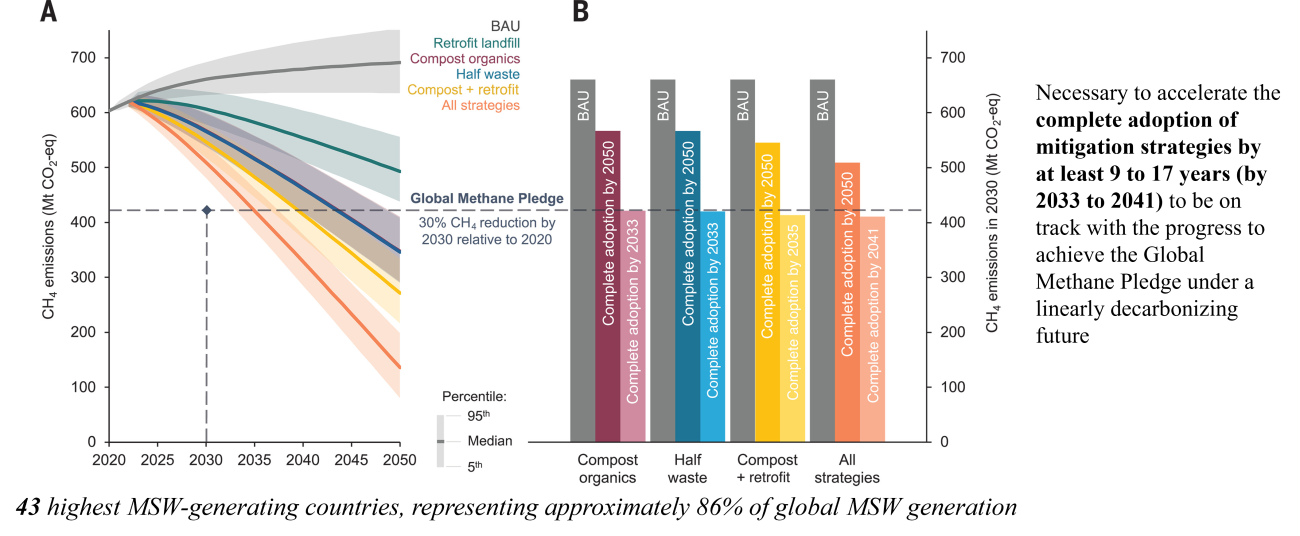Changing the way we handle solid waste could provide a temporary solution for slowing the effects of global warming according to a new study.
Global waste is estimated to generate 2.56 to 3.33 billion tonnes by 2050. While municipal solid waste management hasn’t received much attention as a global warming solution in the past, it has a lot of potential because decomposition of waste releases large amounts of methane, a powerful greenhouse gas.
Yee Van Fan, a Senior Researcher at the ECI, is co-author of the study, Curbing global solid waste emissions toward net-zero warming futures, published in Science.
In their report the researchers say any chance that we may have to limit anthropogenic global warming to 1.5° or 2.0°C, as stipulated by the Paris Accord, will require large and rapid decreases in greenhouse gas emissions across multiple sectors and species. Methane (CH4) emissions from solid waste sites provide a considerable fraction of the global methane budget and are an important target for reductions.
Dr Fan says while there has been lots of focus on climate change and how to reduce the carbon dioxide (CO2) produced through energy use and transportation, the effects of methane on the environment have been overlooked.
Methane is responsible for about one-third of climate warming. It is more potent than carbon dioxide in terms of warming effect, but much less persistent: its life in the atmosphere is about 10.5 years, compared to 120 years for carbon dioxide.
Dr Fan says that simple changes in quantities of solid waste sent to different forms of waste treatment could help us reach the 1.5°C target and global methane pledge.
We are not changing the technology but changing the portion size. This focus on methane will buy us time to fix the CO2 problem.
Compared to carbon dioxide, methane has interesting characteristics. If you keep methane levels at a constant rate then the warming effect is constant as well. But if you reduce methane, you can reduce warming too.”
Dr Fan says reducing methane is more effective in the short term, but has less impact in the long term. So, while it’s not a long-term solution, by using it in the short term we are giving ourselves more time to reach our climate targets.
She added:
Looking at the time each gas spends in the atmosphere, CO2 is there longer. Methane has a lifespan of 10-12 years, but CO2 is there for over a century.
CO2 has a long-term impact and needs more effort to fix. But methane we’re able to tackle in the shorter term and speed up the cooling effect.”

The study is the first global analysis of how reduced methane emissions through better management of municipal solid waste could contribute to climate goals. Researchers assessed the disposal and treatment facilities in 43 countries that collectively produce more than 85% of municipal solid waste globally. They looked at three different treatments of solid waste; landfill, composting and anaerobic digestions and calculated greenhouse gas emissions between the years 1990 and 2020. They also modelled how much waste these countries are likely to produce and the corresponding greenhouse gas emissions, from 2020 through to 2050.
Without any changes to municipal solid waste management, the world’s rubbish is likely to be responsible for approximately 33 to 34 billion tonnes of carbon dioxide warming equivalent emissions between 2020 and 2050.
But the municipal solid waste sector can only emit 11 to 27 billion tonnes of carbon dioxide warming equivalent emissions to stay within the 1.5 or 2.0°C warming limits of the Paris Agreement.
The researchers have warned that the global solid waste sector is not on track for climate targets – neither under the Paris Agreement nor under the Global Methane Pledge, a promise to reduce methane emissions by 30% between 2020 and 2030 that more than 100 countries have signed on to.
They next analysed four different strategies for reducing the climate impact of municipal solid waste: breaking organic waste down in anaerobic digesters and using the resulting biomethane (which would reduce emissions by close to three quarters), halving waste generation (which would yield an approximately two-thirds reduction in emissions); composting organic waste (which could potentially achieve an almost three-fifths reduction); and retrofitting landfills with systems to capture methane (roughly one-third reduction in emissions).
No single strategy can achieve a net-zero warming municipal solid waste system, so a combination of shifts will be necessary, the researchers say. Reducing the volume of waste would have the biggest impact in high-income countries, while sending waste to anaerobic digesters would have the biggest impact elsewhere. Staying within the 1.5°C limit requires adopting more than one strategy.
The authors of the report say implementing those strategies will likely require a combination of government regulation, economic incentives, and communications tools. They say the technologies are there, and it is a matter of whether relevant stakeholders will be aware of the seriousness of this issue and take action by implementing the appropriate technologies for waste treatment.
Read the report in full: Curbing global solid waste emissions toward net-zero warming futures

